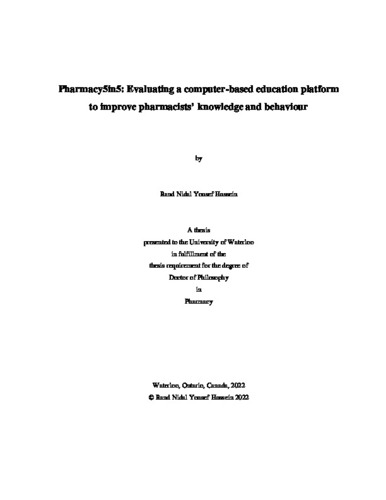| dc.contributor.author | Hussein, Rand | |
| dc.date.accessioned | 2022-05-30 17:48:18 (GMT) | |
| dc.date.available | 2022-09-28 04:50:04 (GMT) | |
| dc.date.issued | 2022-05-30 | |
| dc.date.submitted | 2022-05-26 | |
| dc.identifier.uri | http://hdl.handle.net/10012/18338 | |
| dc.description.abstract | Background The pharmacist’s role continues to evolve and expand from the traditional role of dispensing to a more patient-centered model of care. However, many pharmacists still fall short in terms of their provision of full scope pharmacy services. A new behaviour change intervention is needed to help pharmacists adopt these pharmacy services. One such intervention is computer-based education. There is limited research exploring the effect of computer-based education on pharmacist knowledge, skills and behaviours. There is also a gap in literature on how to refine and design a computer-based educational platform targeting pharmacy professionals.
Objectives The overall goal of this thesis is to provide step-wise guidance on how to design theory-based interventions and to provide outcome information on the effect of an educational platform on improving pharmacists’ knowledge.
Methods This thesis is comprised of three studies. The first study was a scoping review that explored the current literature on how computer-based education affects healthcare professionals’ knowledge, skills and behaviour. The second study used a mixed methods approach which combined a self-reported survey with semi-structured interviews to explore barriers, facilitators and corresponding behaviour change techniques that are applicable to computer-based education. Based on these findings, the third study assessed the effect of one example of computer-based education on pharmacists’ knowledge using a randomized controlled trial.
Results The scoping review showed that studies assessing the effect of computer-based education were mostly focused on user satisfaction, knowledge gain and self-reported behaviour. Moreover, few studies reported using a theoretical framework for the development of or to guide the selection of design features. Using the theoretical domains framework, a wide range of barriers and facilitators were identified for full scope services. Moreover, a total of 18 behaviour change techniques were identified which can be incorporated into computer-based education. The randomized controlled trial showed that computer-based education can significantly improve knowledge and is at least as effective as printed education material.
Conclusion With the rapid transition to computer-based education due to the COVID-19 pandemic, a better understanding of computer-based education is critical. This thesis demonstrates the effectiveness of computer-based education in educating pharmacists, as well as its promising potential as a behaviour change intervention. More rigorous evaluation is needed to assess all possible learning outcomes including behaviour and practice change. | en |
| dc.language.iso | en | en |
| dc.publisher | University of Waterloo | en |
| dc.subject | behaviour | en |
| dc.subject | knowledge | en |
| dc.subject | computer-based education | en |
| dc.subject | pharmacists | en |
| dc.title | Pharmacy5in5: Evaluating a computer-based education platform to improve pharmacists’ knowledge and behaviour | en |
| dc.type | Doctoral Thesis | en |
| dc.pending | false | |
| uws-etd.degree.department | School of Pharmacy | en |
| uws-etd.degree.discipline | Pharmacy | en |
| uws-etd.degree.grantor | University of Waterloo | en |
| uws-etd.degree | Doctor of Philosophy | en |
| uws-etd.embargo.terms | 4 months | en |
| uws.contributor.advisor | Grindrod, Kelly | |
| uws.contributor.affiliation1 | Faculty of Science | en |
| uws.published.city | Waterloo | en |
| uws.published.country | Canada | en |
| uws.published.province | Ontario | en |
| uws.typeOfResource | Text | en |
| uws.peerReviewStatus | Unreviewed | en |
| uws.scholarLevel | Graduate | en |

